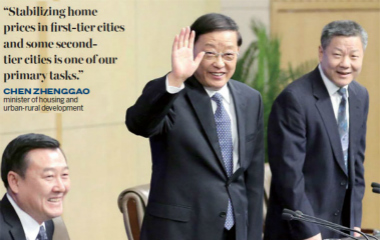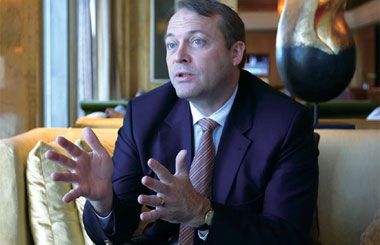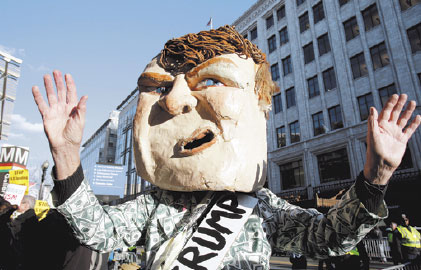Trump outlines foreign policy positions
Updated: 2016-03-23 08:28
By Associated Press in Washington(China Daily)
|
|||||||||
Republican presidential front-runner Donald Trump confronted doubts on Monday about the depth of his knowledge of world affairs, delivering a sober speech to a pro-Israel crowd and outlining for the first time his team of foreign policy advisers.
In a lengthy interview with the editorial board of The Washington Post, Trump outlined a distinctly noninterventionist approach for the United States in the world.
"I do think it's a different world today, and I don't think we should be nation-building anymore," Trump said. He stressed instead the need to invest in infrastructure at home.
"At what point do you say, 'Hey, we have to take care of ourselves'?" he said. "So, I know the outer world exists and I'll be very cognizant of that. But at the same time, our country is disintegrating, large sections of it, especially the inner cities."
Trump has largely avoided policy details during his campaign, focusing instead on boldly stated goals and saying last week in an interview with MSNBC that his "primary consultant is myself".
During the interview, Trump stumbled when questioning the US role in assisting Ukraine in its conflict with Russia.
"They're not doing anything. And I say: 'Why is it that Germany's not dealing with NATO on Ukraine? Why is it that other countries that are in the vicinity of Ukraine, why aren't they dealing?'" he said.
In fact, since the Ukraine crisis erupted more than two years ago, the Obama administration has refused to provide the new, pro-Western government in Kiev offensive military equipment to use against Russian-backed separatists.
And while a February 2015 cease-fire helped reduce the worst of the violence, Germany and France led that mediation effort. The United States wasn't directly involved.
To be 'neutral'
Trump has also drawn concerns from Jewish leaders for saying he would attempt to be "neutral" in the decades-long Israeli-Palestinian conflict. He worked to soothe those worries on Monday in a major speech before the annual gathering of the American Israel Public Affairs Committee.
In a speech delivered from prepared remarks and a teleprompter, a rarity for Trump, he stressed that he is "a lifelong supporter and true friend of Israel".
Trump's remarks largely focused on Iran, calling the deal reached last year with several world powers aimed at keeping it from acquiring nuclear weapons "catastrophic for America, for Israel and to the whole Middle East".
He also said he would reject any attempt by the United Nations to impose conditions on either side during future peace talks in the Israeli-Palestinian conflict, saying that "it will only further delegitimize Israel".
Anti-Trump protesters gathered outside the venue, but there was no mass walkout of AIPAC attendees as some had planned.
Democratic presidential front-runner Hillary Clinton also addressed the conference, questioning Trump's readiness to guide the nation through international entanglements.
"We need steady hands," Clinton said. "Not a president who says he's neutral on Monday, pro-Israel on Tuesday and who-knows-what on Wednesday because everything's negotiable."
Israel's security, she proclaimed, "is non-negotiable".
|
Anti-Trump protesters rally outside during the American-Israeli Public Affairs Committee Conference in Washington on Monday. Yuri Gripas/ Reuters |
(China Daily 03/23/2016 page12)
Today's Top News
Europe ramps up security in wake of Brussels attacks
Series of blasts rock airport, metro in Brussels
Scotland to team up with SinoFortone
China to roll out new five-year plan for energy sector
Russia retrieves data from recorder of crashed plane
Paris attacks suspect wounded in Brussels shootout
China's latest GDP target is attainable: OECD Chief
What makes the middle class tick
Hot Topics
Lunar probe , China growth forecasts, Emission rules get tougher, China seen through 'colored lens', International board,
Editor's Picks

|

|

|

|

|

|







